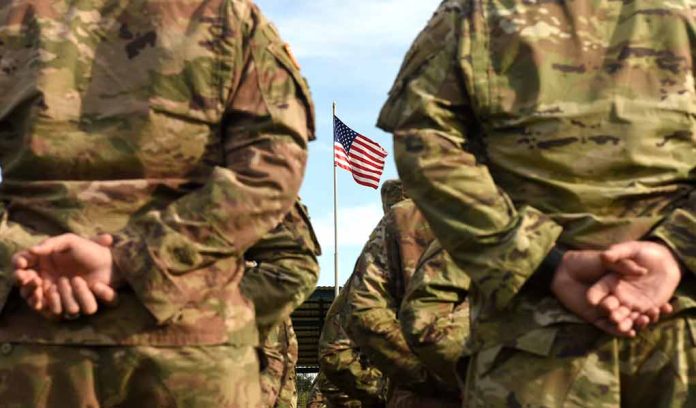
New Mexico deploys National Guard to Albuquerque as juvenile crime and fentanyl crisis overwhelm local police resources, but critics argue more comprehensive reforms are needed to truly address the city’s public safety challenges.
Key Takeaways
- Governor Michelle Lujan Grisham has ordered 60-70 National Guard personnel to assist Albuquerque police by mid-May, focusing on administrative tasks to free up officers.
- The deployment comes in response to a fentanyl epidemic that contributed to 65% of overdose deaths in New Mexico in 2023 and rising juvenile crime rates.
- Republican critics argue the deployment is insufficient without bail reform and harsher penalties for criminals.
- Operation Route 66 has already led to the seizure of 2,700 fentanyl pills and nearly 400 arrests in the area.
- National Guard members will be unarmed and in civilian clothing, handling duties like scene security, traffic control, and prisoner transport.
National Guard Deployment Targets Escalating Crime Crisis
Governor Michelle Lujan Grisham’s recent executive order will place 60-70 National Guard personnel in Albuquerque by mid-May to combat what officials describe as “critical issues requiring immediate intervention.” The deployment aims to address the city’s fentanyl epidemic and alarming rise in juvenile crime that has strained local law enforcement resources. National Guard members will not directly confront criminals but instead handle administrative tasks like scene security, traffic control, and prisoner transport to allow police officers to focus on their primary public safety duties.
Albuquerque’s police department has documented 2,600 arrests or citations of minors aged 11 to 17 over the past five years. A recent case highlighted the severity of juvenile crime when a 13-year-old boy was charged with first-degree murder following a fatal car accident. The teen had also been linked to a series of burglaries, exemplifying the concerning trend of increasingly serious offenses committed by young people in the city.
If crime in ABQ is down, then why do we need the National Guard to assist APD with handling crime?#nmpol #kellerkrime @NicoleforNM @MayorKeller pic.twitter.com/oCHjddA6G5
— New Mexico Senate Republicans (@NMSenate_GOP) April 9, 2025
Operation Route 66 Shows Progress But Challenges Remain
Bernalillo County Sheriff John Allen reported significant success from Operation Route 66, a targeted law enforcement initiative that has already seized 2,700 fentanyl pills and resulted in nearly 400 arrests. The operation represents one component of the multi-pronged effort to combat the fentanyl crisis, which was implicated in 65% of all overdose deaths in New Mexico last year. Despite these achievements, officials acknowledge that additional resources are necessary to effectively manage the scope of the drug problem.
A particularly problematic 2-mile stretch along Central Avenue has become notorious for homelessness and drug abuse. Residents like Will Stephens, a retired chef, experience the effects of these problems daily as drug users frequently loiter near his home. While Stephens supports the National Guard deployment, he has developed his own coping strategy in the meantime, stating, “Every day, I have to deal with it. I ignore them. That’s the best way to deal with it. It’s not worth getting caught up in stupidness.”
Republicans Call for Stronger Measures
Republican critics argue that the National Guard deployment alone represents an insufficient response to Albuquerque’s crime crisis. New Mexico Republican Party Executive Director Leticia Muñoz has called for more substantial reforms, particularly to the state’s bail system, which she believes allows dangerous offenders to quickly return to the streets. Muñoz also criticized a proposed pilot program that would offer housing assistance to juvenile suspects following detention.
“No, this is definitely not enough. What this is, is you can see a mismanagement, obviously, of the mayor. And, you know, as much as we appreciate all the work that the law enforcement is doing here in Albuquerque, we know that their hands are tied. We know that there needs to be bail reform and reform as far as the deterrent of keeping individuals in jail longer,” remarked Muñoz.
Community Response Mixed as Implementation Begins
Community reactions to the National Guard deployment have been varied. Mayor Tim Keller has expressed optimism about recent improvements in crime statistics, stating, “We’re finally seeing a sustained positive shift in most crime trends for the first time in decades, and now is the time to build on that momentum.” The National Guard members will wear civilian clothing and remain unarmed to minimize disruption in the community while performing their support functions.
The ACLU of New Mexico has voiced concerns about potential civil rights violations that could accompany increased policing. As Governor Lujan Grisham’s plan moves forward, authorities will need to balance enhanced enforcement with constitutional protections. The coming months will reveal whether this unconventional approach will deliver meaningful improvements to public safety in Albuquerque or whether more comprehensive reforms, as Republicans suggest, are necessary to address the root causes of the city’s crime problems.
Sources:
National Guard to help Albuquerque fight crime, but some wonder if it’s necessary



